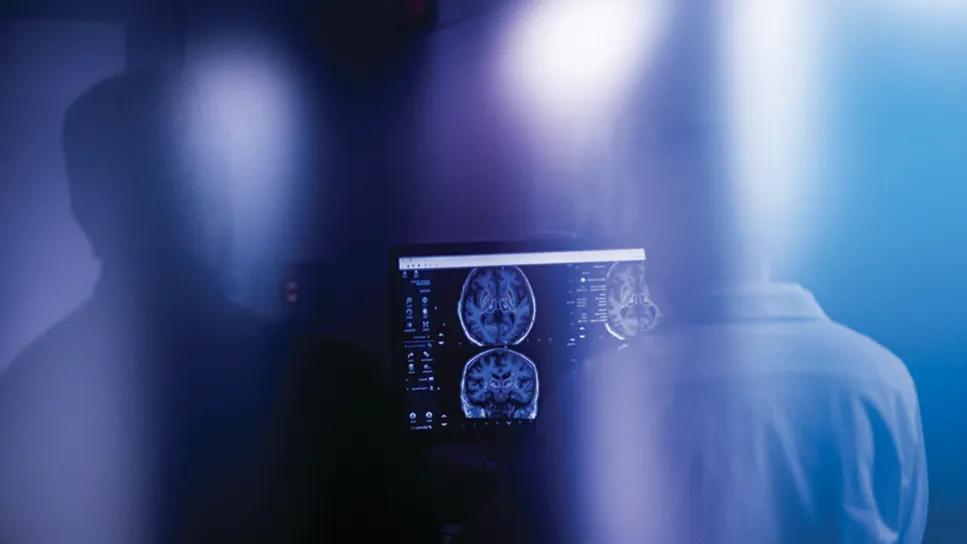Novel research is comparing sleep measures to biomarkers of neurodegeneration

Image content: This image is available to view online.
View image online (https://assets.clevelandclinic.org/transform/3670b07a-1bc2-4ee4-ad8a-6d7e5792d0b9/parkinsons-disease-and-cognitive-subtypes)
Brain scans
Why women develop Alzheimer’s disease (AD) at a higher rate than men and tend to have more rapid cognitive decline are intriguing unanswered questions. Evidence indicates that differences between the sexes cannot be attributed to apolipoprotein E (APOE) genotype, age or education level. Some studies have found associations with AD progression and sleep deficits, but whether this can help account for the sex differences is unknown.
Advertisement
Cleveland Clinic is a non-profit academic medical center. Advertising on our site helps support our mission. We do not endorse non-Cleveland Clinic products or services. Policy
A multidisciplinary team of researchers led by Reena Mehra, MD, MS, Research Director of Cleveland Clinic’s Sleep Disorders Center, is leveraging state-of-the-art tools from sleep research, neuroimaging, and blood and cerebrospinal fluid (CSF) biomarker analysis to investigate sex-specific influences of sleep and circadian rhythm disruption on neurocognitive decline in AD.
“This line of investigation is not represented in the current literature,” says Dr. Mehra. “Our research has the potential to transform understanding of sleep’s role on sex differences in AD outcomes and potentially lead to interventions to help stave off the disease.”
Previous research by Cleveland Clinic sleep disorder and AD experts characterized a cohort of patients with AD at the mild cognitive impairment stage (MCI-AD) with regard to CSF and plasma biomarkers of immunity, inflammation and neurodegeneration relative to circadian rhythm and sleep disruption. Their findings, published in the Journal of Alzheimer’s Disease (2021:81[2]:487-492), included identification of sleep irregularities accompanied by altered immune and inflammatory profiles, increased CSF neurodegeneration biomarkers (p-tau and t-tau) and progression of cognitive decline.
Further studies have leveraged a cohort of study participants from the National Institute on Aging (NIA)-funded IMMUNE AD study, led by Dr. Mehra’s co-investigator Stephen Rao, PhD, Director of the Schey Center for Cognitive Neuroimaging at Cleveland Clinic. Using patients at genetic risk for Alzheimer’s disease, the study collected data on blood and CSF biomarkers of AD and inflammation, as well as conducted advanced brain neuroimaging (structural and functional 3T MRI and amyloid PET imaging) with 24-month repeated measures.
Advertisement
The IMMUNE AD study was designed to evaluate the neuroprotective effects of exercise, and exploring associations with sleep and circadian rhythm biology are not among its aims. However, Dr. Mehra conducted an ancillary study independent from the IMMUNE-AD funding source to conduct hundreds of sleep studies on the study’s well-characterized participants, including overnight sleep apnea monitoring and one- to two-week actigraphy.
With this preliminary research, the Women’s Alzheimer Movement granted her a research award to further investigate this cohort and evaluate it for sex-specific differences. Deep phenotyping using RNA transcriptomic signatures is being conducted to assess circadian rhythm function, with the collaboration of circadian rhythm biology expert Sujata Rao, PhD, of Cleveland Clinic’s Lerner Research Institute. Participants will be followed for up to 24 months to enable longitudinal association of results with measures of neurocognitive decline.
“Our findings suggest that there are interdependent and independent mechanisms of circadian rhythm and sleep disruption in AD pathophysiology,” says Dr. Mehra. “We are particularly interested in whether we can identify sex differences in these mechanisms.”
The group’s initial data indicate that specific circadian rhythm disruption susceptibility profiles unique to women may play a role in their greater neurocognitive decline relative to men.
Based on findings of the current research, Dr. Mehra next intends to apply for NIA funding to delve deeper into this area, by enlarging the size of the study group and extending the follow-up period. In addition to the clinical sleep, laboratory, imaging and cognition studies, she intends to further explore the cohort with RNA transcriptomics and DNA methylation studies to characterize circadian rhythm dysfunction at a deeper level.
Advertisement
Eventually she would like to focus on therapeutics — specifically by repurposing existing pharmacologic agents targeting sleep and circadian rhythm disruptions, as well as developing novel molecular targets using advanced techniques in collaboration with Cleveland Clinic’s Center for Computational Life Sciences in partnership with IBM.
“We are setting the stage for personalized approaches to Alzheimer’s disease prevention,” Dr. Mehra says. “We expect that these studies will one day help us better stratify risk and offer more specific therapies.”
Advertisement
Advertisement
An expert talks through the benefits, limits and unresolved questions of an evolving technology
How we’re efficiently educating patients and care partners about treatment goals, logistics, risks and benefits
Large NIH-funded investigation is exploring this understudied phenomenon
Observational evidence of neuroprotection with GLP-1 receptor agonists and SGLT-2 inhibitors
Genomic study lays groundwork for insights into potential biomarkers and therapeutic strategies
Proteins related to altered immune response are potential biomarkers of the rare AD variant
Alzheimer’s studies delve into sex-related variances in the expression of the disease
Validated scale provides a method for understanding how lifestyle may protect against Alzheimer's